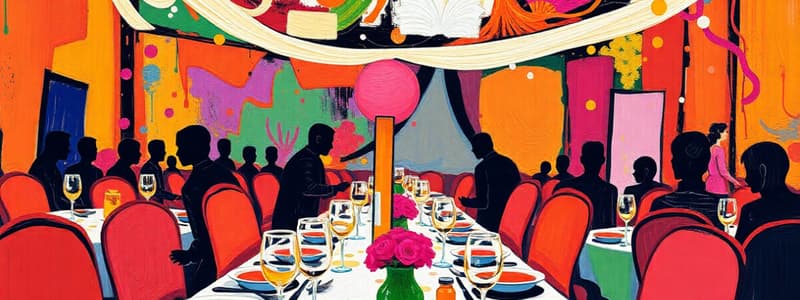Podcast
Questions and Answers
What is a defining characteristic of a banquet compared to a regular meal?
What is a defining characteristic of a banquet compared to a regular meal?
- Banquets are typically held outdoors.
- Banquets are always informal gatherings.
- Banquets usually include multiple courses. (correct)
- Banquets are solely for business purposes.
Which element is generally NOT considered essential for a banquet?
Which element is generally NOT considered essential for a banquet?
- An elaborate menu
- Live entertainment (correct)
- Formal attire
- A large number of guests
In terms of cultural significance, how have banquets historically functioned?
In terms of cultural significance, how have banquets historically functioned?
- Banquets are primarily for casual socializing.
- Banquets have only been used for religious ceremonies.
- Banquets are exclusively modern traditions.
- Banquets have served as venues for political negotiations. (correct)
What is one of the primary purposes of guest management services at a banquet?
What is one of the primary purposes of guest management services at a banquet?
What factor can significantly influence the cost of a banquet?
What factor can significantly influence the cost of a banquet?
Which of the following is typically included in the ambiance of a banquet?
Which of the following is typically included in the ambiance of a banquet?
How have modern banquets adapted to cultural preferences?
How have modern banquets adapted to cultural preferences?
What is an important aspect of planning a banquet?
What is an important aspect of planning a banquet?
Flashcards
Banquet definition
Banquet definition
A large, formal meal, often a celebratory occasion, featuring multiple courses and a festive atmosphere.
Banquet elements: Food
Banquet elements: Food
Banquets typically have multiple courses, from appetizers to desserts, with a menu tailored to the occasion.
Banquet elements: Setting
Banquet elements: Setting
The venue must accommodate a large number of guests, with decorations and ambiance to create a celebratory mood.
Banquet elements: Attire
Banquet elements: Attire
Signup and view all the flashcards
Banquet planning: Consideration
Banquet planning: Consideration
Signup and view all the flashcards
Banquet purpose
Banquet purpose
Signup and view all the flashcards
Historical banquet significance
Historical banquet significance
Signup and view all the flashcards
Modern banquet variety
Modern banquet variety
Signup and view all the flashcards
Study Notes
Definition and Purpose
- A banquet is a large, formal meal, often a celebratory occasion.
- It usually involves a substantial meal, multiple courses, and an atmosphere of festivity.
- Banquets can be held for various reasons, including celebrations, awards ceremonies, business meetings, or political events.
Elements of a Banquet
- Food: A banquet typically features multiple courses, from appetizers to desserts. The menu is often elaborate and tailored to the occasion.
- Drinks: Beverages are essential, ranging from alcoholic drinks like wine and cocktails to non-alcoholic options like water, juice, and soft drinks.
- Setting: The venue is important, requiring a suitable space capable of accommodating a large number of guests. Decorations and ambiance create a celebratory mood.
- Attire: Appropriate attire is customary, often formal like suits or gowns.
- Entertainment: Live music, speeches, performances, or entertainment can elevate the experience for guests. This might also include a more informal 'after-party' or similar event.
- Ambiance: The atmosphere is significant, involving the decor, lighting, music, or personal touches. The goal is a celebratory and welcoming environment.
- Guest Management & Services: Staff are responsible for managing the guest flow, waiting staff, etc. Ensuring the smooth flow of the event is crucial, from check-in to serving.
History and Cultural Significance
- Banquets have a long history, appearing in various cultures across time. They have been used to celebrate events, forge alliances, and display power and wealth.
- Certain kinds of banquets have played roles in historical events. For example, banquets served as key locations for political negotiations or power displays.
- Banquets vary across cultures, with differences in food, formality, and symbolism.
Modern Banquets
- Modern banquets often adapt to diverse cultural preferences, making them inclusive for multiple backgrounds and individuals.
- Banquets are still a widely used social function and are frequently held in various settings and with diverse occasions.
- Cost and planning of a modern banquet can vary significantly, depending on the event's size, location, menu, and desired level of formality.
Planning and Organization
- Banquet planning requires careful consideration of the occasion, budget, guest list, location, and food choices.
- Logistics include booking venues, coordinating catering, creating a guest list, and managing the event timeline.
- Budgeting for a banquet includes cost considerations for decorations, food, staff, supplies, and location.
- Successful banquet planning requires coordination and communication among different stakeholders to ensure efficiency.
Studying That Suits You
Use AI to generate personalized quizzes and flashcards to suit your learning preferences.




